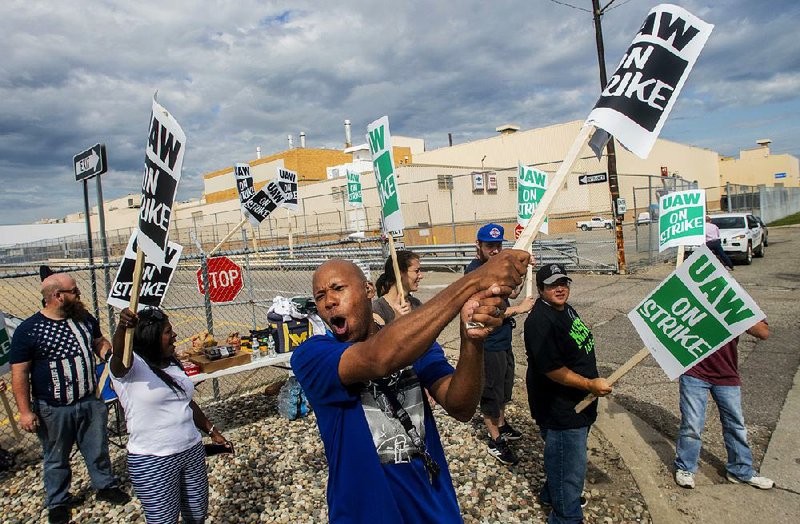DETROIT -- About 49,000 workers at General Motors plants in the U.S. went on strike early today, but talks between the United Auto Workers and the automaker are scheduled to resume.
At a meeting Sunday morning in Detroit, about 200 plant-level union leaders voted unanimously in favor of a walkout. Union leaders said the sides were still far apart on several major issues, and they apparently weren't swayed by a GM offer to make new products at or near two of the four plants it had been planning to close, according to someone briefed on the matter.
"We stood up for General Motors when they needed us most," union Vice President Terry Dittes said in a statement, referring to union concessions that helped GM survive bankruptcy protection in 2009. "Now we are standing together in unity and solidarity for our members."
"Going into the bargaining season, our members have been very clear of what they will and will not accept in this contract," Dittes said.
UAW spokesman Brian Rothenberg said Sunday evening that contract talks will resume at 10 a.m. today.
GM on Friday offered to build a new all-electric pickup at a factory in Detroit that is scheduled to close next year, according to a source who spoke on the condition of anonymity because that person wasn't authorized to disclose details of the negotiations, which hadn't been released to the public.
[Video not showing up above? Click here to watch » https://www.youtube.com/watch?v=xjEkURDF34c]
The automaker also offered to open an electric-vehicle battery plant in Lordstown, Ohio, where it has a plant that has already stopped making cars. The new factory would be in addition to a proposal to make electric vehicles for a company called Workhorse, the person said.
It's unclear how many workers the two plants would employ. The planned closures have consistently drawn criticism from President Donald Trump, who has demanded that the Lordstown plant be reopened.
The UAW's Rothenberg said the company made general statements about why the union was planning to strike, but he would not comment further on GM's offer. The union said it was striking for fair wages, affordable health care, profit sharing, job security and a path to permanent employment for temporary workers.
In a statement, GM said the offer made to the union Saturday included more than $7 billion in U.S. factory investments and the creation of 5,400 new positions, a minority of which would be filled by existing employees. GM would not give a precise number. The investments would be made at factories in four states, two of which were not identified.
The statement also said the company offered "best in class wages and benefits," improved profit sharing and a payment of $8,000 to each worker upon ratification. The offer included wage or lump-sum increases in all four years of the deal, plus "nationally leading" health benefits, GM said.
"We presented a strong offer that improves wages, benefits and grows U.S. jobs in substantive ways and it is disappointing that the UAW leadership has chosen to strike at midnight tonight," the company said Sunday. "We have negotiated in good faith and with a sense of urgency. Our goal remains to build a strong future for our employees and our business."
The announcement came hours after the union let its contract with GM expire Saturday night.
In the strike, pickets are shutting down a total of 55 GM facilities, with 33 manufacturing sites and 22 parts-distribution warehouses. GM has factories in Michigan, Ohio, New York, Kentucky, Tennessee, Texas, Missouri, Indiana and Kansas.
During the strike, about 2,000 Teamsters will refuse to transport GM vehicles to dealerships out of solidarity with the UAW, said Bret Caldwell, a spokesman for the International Brotherhood of Teamsters union.
"Our members won't cross the picket line," Caldwell said Sunday. "They stood with us when we have fought employers. This is another way we can stand with them."
On Saturday, Dittes, the UAW's chief bargainer, said in a letter to GM members that after months of bargaining, both the union and GM were far apart on issues such as wages, health care, temporary employees, job security and profit sharing.
STRIKE'S EFFECTS
The strike brings to a halt GM's U.S. production, and it will likely stop the company from making vehicles in Canada and Mexico as well. That could mean fewer vehicles for consumers to choose from on dealer lots, and it will make it impossible to build specially ordered cars and trucks.
A prolonged strike against GM could be painful for both sides, said Kristin Dziczek, vice president of industry, labor and economics at the Center for Automotive Research in Ann Arbor, Mich.
Shutting down North American production costs GM about $400 million a day, Dziczek said. It's also a big sacrifice for UAW workers, who get only $250 a week in strike wages, she said. The union had $721 million in its strike fund in 2018 and temporarily increased dues in March of this year to boost the fund to $850 million.
GM has 90 to 100 days of inventory for most of the vehicles that are in high demand, Dziczek said. Consumers might find it harder to get certain colors or trims after a couple of weeks, but it will help that dealers trade with one another.
"GM has enough inventory for a short strike of one or two weeks. After that, it starts to get painful," Dziczek said.
A strike would be the union's first since a two-day work stoppage at GM in 2007.
On Friday, union leaders extended contracts with Ford and Fiat Chrysler indefinitely, but the pact with GM expired Saturday night.
The union picked GM, which is more profitable than Ford and Fiat Chrysler, as the target company, meaning it's the focus of bargaining and would be the first company to face a walkout.
Talks between the union and GM were tense from the start, largely because GM plans to close four U.S. factories, including the plant in Lordstown and one on the Detroit border with the enclave of Hamtramck. The union has promised to fight the closures.
The main areas of the dispute between U.S. automakers and the union are:
• GM is making big money, $8 billion last year alone, and workers want a bigger slice. The union wants annual pay raises to guard against an economic downturn, but the company wants to pay lump sums tied to earnings.
• The union also wants new products for the four factories GM wants to close. The factory plans have irked some workers, although most of those who were laid off will get jobs at other GM factories.
• American companies want to close the labor-cost gap with workers at plants run by foreign automakers. GM pays $63 per hour in wages and benefits compared with $50 at foreign-owned factories. GM's gap is the largest at $13 per hour, followed by Ford at $11 and Fiat Chrysler at $5, according to figures from the Center for Automotive Research.
• Union members pay about 4% of the cost of their current health insurance plans while employees at large firms nationwide pay about 34%, according to the Kaiser Family Foundation. The automakers would like to cut costs.
Information for this article was contributed by Tom Krisher of The Associated Press; by Jamie L. LaReau of the Detroit Free Press; and by Deanna Paul and Alex Horton of The Washington Post.
A Section on 09/16/2019

